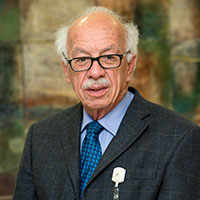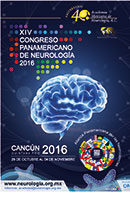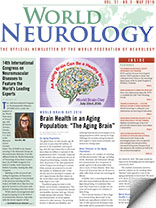J.Eduardo San Esteban, MD

J.Eduardo San Esteban, MD
From Oct. 29th to Nov. 3rd, 2016, Cancun, Mexico, will host the 14th Pan American Congress of Neurology. This will be the second time for the Pan American Congress to be held in this country. Mexico hosted the fourth Pan American Congress in 1975. There have been more than 50 years of Pan American neurology meetings and maybe the time has come to question ourselves as to whether we have made some progress in this continent in building a real Pan American Neurology and more important, how prepared we are to develop an alliance to help each other in the pursuit of improved care of our patients with neurological illness.
The American continent, with a population of around one billion is marked by inequality in human development. We also have a diversity of geographic, economic, political, and cultural systems. And, of course, we also have different health systems to provide care to an ever more demanding population. The obvious differences between the countries north and south of the Rio Grande have provided the grounds for a multinational effort to increase our cooperation. There are social and economic treaties, cultural and professional agreements, some of them with better results than others, but all of them with the idea of finding an improved quality of life. The cooperation among the Latin American states has been also prolific. Despite some differences, our similarities have prevailed, and in multiple examples we can see the results of intelligent and generous collaborations.
 Neurological disease has increased its burden over the world population. Naturally, the Pan American community is no exception. There are some particular situations in different areas— infectious and parasitic disease are still everyday events in some areas, malnutrition and metabolic in others, children with sequelae of difficult pregnancies and deliveries are prevalent in some communities, but the frequent pathologies of the nervous system are similar in all of our countries. Cerebrovascular disease, epilepsy, neurodegenerative disease, developmental difficulties, headaches, and behavioral syndromes have a very similar prevalence. Increases in communication and migration have also contributed to provide a more universal panorama of illness. And, of course the appearance of new threats like Zika virus has swiftly become a multinational preoccupation.
Neurological disease has increased its burden over the world population. Naturally, the Pan American community is no exception. There are some particular situations in different areas— infectious and parasitic disease are still everyday events in some areas, malnutrition and metabolic in others, children with sequelae of difficult pregnancies and deliveries are prevalent in some communities, but the frequent pathologies of the nervous system are similar in all of our countries. Cerebrovascular disease, epilepsy, neurodegenerative disease, developmental difficulties, headaches, and behavioral syndromes have a very similar prevalence. Increases in communication and migration have also contributed to provide a more universal panorama of illness. And, of course the appearance of new threats like Zika virus has swiftly become a multinational preoccupation.
The neurological community has an ideal opportunity to play a significant part in this continental effort. The southern countries have a common language, a very similar cultural background, and a rather equal social, ethnic, and developmental history. We also have a significant increase in technology and communications that have made distances shorter and real-time interaction an everyday occurrence. The northern countries have developed scientific and technological strength that keep them in the frontier of new knowledge. The advance of educational technological facilities have made teleconferences, telemedicine, online courses, and consultations an everyday event.
The question is: Can we, the neurologists of the American continent, build a professional, scientific, social, and educational alliance to help with the possibilities of improving the care of neurological patients around the continent?
What should we do and what can we do to achieve a situation of true and universal cooperation? A north, south, east, and west alliance can be a reality in the fields of education, epidemiology, interchange of information, online consultations, collaborative studies, and so on.
No doubt, the area of neurological education seems the immediate possible goal. There are already multiple programs ongoing. The traditional journey of Latin American professionals to the United States and Canada for an update in the state-of-the-art of neurology, and programs for the neurological subspecialties are a common-day reality. But the extent of these educational efforts hardly meets the needs of a large population of specialists who do not have the opportunities to travel. Well-planned alliances between countries could help to reduce these gaps. Online education is a useful tool. Teleconferences and meetings, and the distribution of information in accordance with a well-planned program that avoids commercialization of information, are all possible ways of collaboration.
The production of human resources for neurological care is another area where alliances can prove beneficial. Based in carefully performed studies that provide information about needs, a combined program of online and onsite education can help to reduce the lack of the most needed professional and technical resources. Even at the level of pre-graduate students, a multinational effort could address the needs of medical schools for a more complete neurological education. Education of first-contact physicians, family and general practitioners, and even paramedical personnel that provide attention in remote areas can be tackled by such an alliance.
Time is short. Population growth is fast, and new challenges wait for us everyday. Maybe the time has come to stop the search for the lost time and start a true alliance of Pan American countries to improve the health of our people who ail from neurological diseases. Maybe, as multinational independent professionals, with no other aims but to help our patients, we can put forth a special effort to develop such an alliance. Maybe we can have a continental Pan American neurology that can help bring the benefits of science, knowledge, and technology to a large population of patients who do not currently have opportunities to enjoy the same care as others. There are more than 30 countries in our continents united by geographical chance, but with the need to be united by more than that.
The forthcoming Pan American Congress in Cancun could be an opportunity to talk about these themes and ideas, and perhaps come up with an incipient program to help us make up the lost time.
